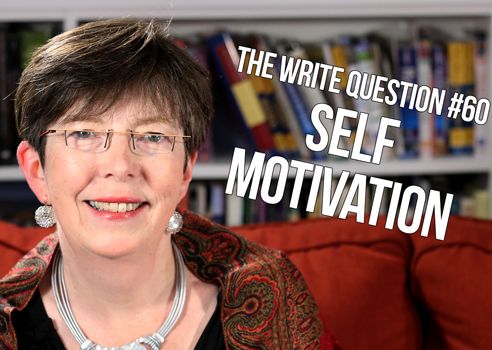Viewing time: 4 min. 6 sec.
The Write Question is a weekly video podcast about writing that I started in 2017 and that ran, more or less weekly, until April 2022. This is a republication of issue #60, with advice about better self-management for writers. The post first ran on June 29/18.
Transcript:
Welcome to The Write Question, I’m Daphne Gray-Grant. Today I’m talking about better self-management for writers.
I’m going to do something a little unusual today because I have TWO questions from different readers that strike me as quite similar. I’m going to answer both. Here’s the first question from Mauricio Iraheta, who is from El Salvador but is currently living in France. Here’s what he wrote to me:
“I always have a little voice inside of me that says: ‘Hey Mauricio, you don’t have the potential to be a good writer.’ I feel especially lost when it comes to choosing a subject. I’d appreciate it if you could give me your advice on how to choose better subjects and how I can improve my motivation for writing.”
Then, a few days later, I received an email from Yusuff Olamide. Here’s what he wrote:
“I have passion for writing but it’s been so hard for me to come up with a good article let alone a topic for a book. Is it that am not talented enough to do this? Can you give me any advice?”
Thanks for the questions, Mauricio and Yussuf. It’s interesting to me that you both have doubts about your own abilities AND that you both struggle to identify subjects that you want to write about. These issues are clearly related.
Doubt is a powerful emotion and it can tie us in knots. Many writers try to ignore it, thinking that’s the best way to deal with it. Sadly, they are wrong.
Begin by understanding that doubt is neither good nor bad. It’s just an emotion. Instead of ignoring it, surprise doubt by paying attention to it. This will take it off its guard and allow you to continue to write.
Pay attention to the physical symptoms you experience when you feel doubt. In particular, many people either forget to breathe or they hold their breath. This habit only makes the emotion more distressing. I’ve included a link below on how to break this bad habit, which I call writing apnea.
Understand that doubt will pass, as all emotions do. Nothing lasts forever, not even doubt. Awful as the feeling may seem, you can be confident that it will eventually subside.
So, do your work regardless. It will take willpower to keep writing but don’t give doubt the privilege of being your excuse. All of us have the most willpower right after waking up in the morning so that’s the time I suggest you write. I’ve included a link to a post on the neuroscience willpower, below. I think you’ll find it helpful.
Don’t forget to record your achievements and celebrate them. I keep a chart showing how many words I write each day. This record is enormously comforting to me because — like every other writer on the face of the planet — I experience doubt, too.
In terms of what to write about, I think you will discover that finding subjects is a lot easier if you get your doubt under control. Look to your own life for ideas. What excites and interests you? What do YOU enjoy reading about? What do you like talking about with your friends? Writing doesn’t always have to be super-serious on super-important topics. The main issue, I think, is that the subject must interest YOU.
Finally, let me wrap up with a quote from the late yoga teacher B.K.S. Iyengar. “If doubt arises in your discipline, let it come. You do your work, and let doubt go about its work. Let’s see which one gives up first.”
Mauricio and Yussuf, don’t let yourself give up before doubt throws in the towel. And if you can outwit doubt, I expect you’ll be very happy with the multitude of writing subjects that will start springing to your minds.


